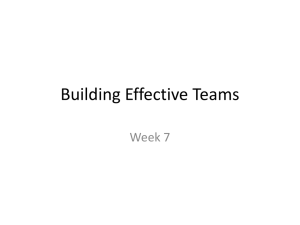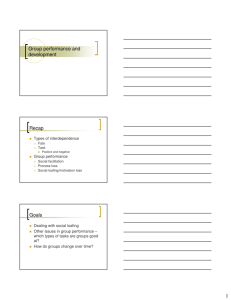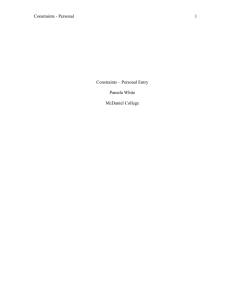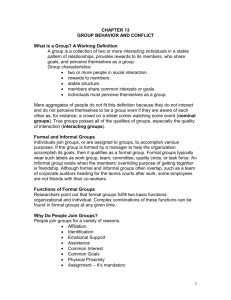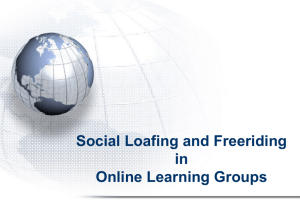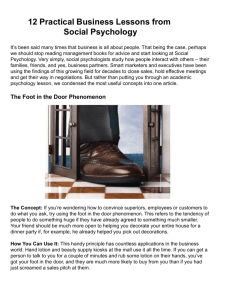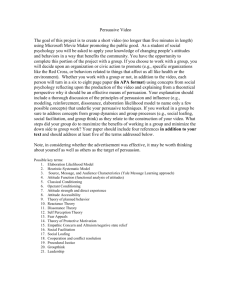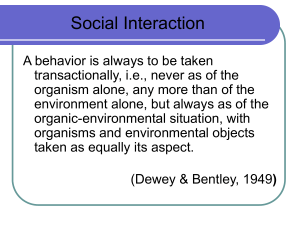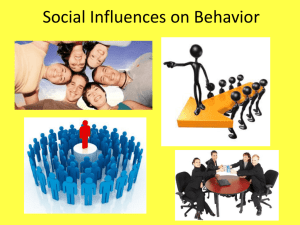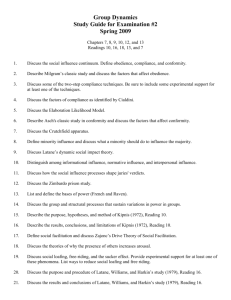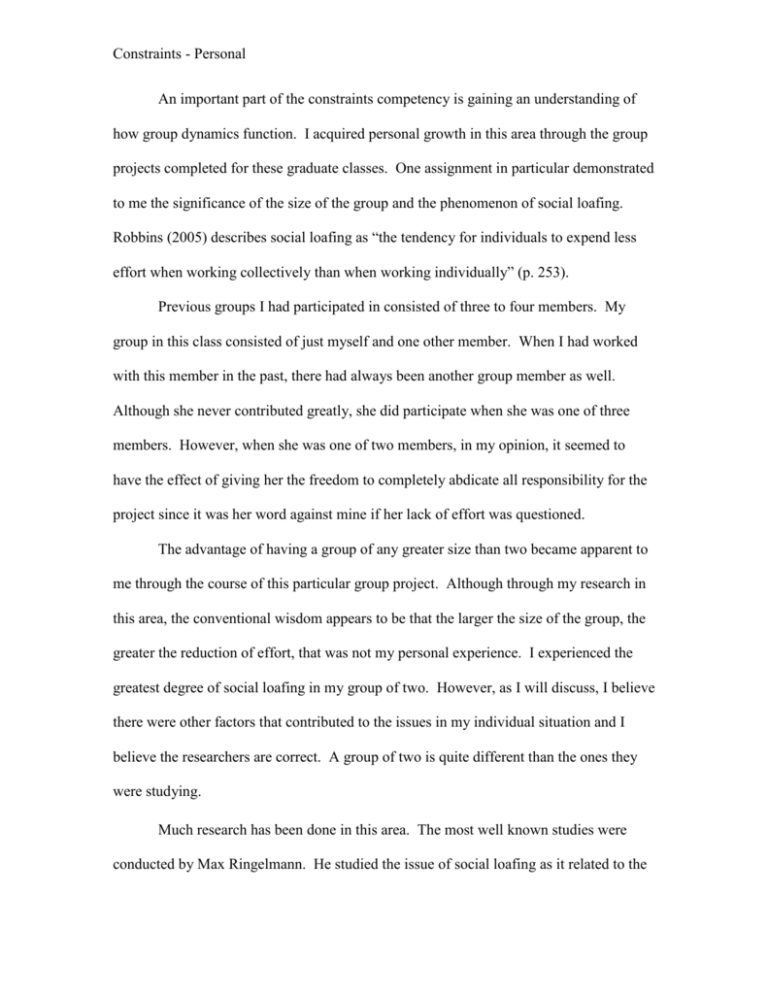
Constraints - Personal
An important part of the constraints competency is gaining an understanding of
how group dynamics function. I acquired personal growth in this area through the group
projects completed for these graduate classes. One assignment in particular demonstrated
to me the significance of the size of the group and the phenomenon of social loafing.
Robbins (2005) describes social loafing as “the tendency for individuals to expend less
effort when working collectively than when working individually” (p. 253).
Previous groups I had participated in consisted of three to four members. My
group in this class consisted of just myself and one other member. When I had worked
with this member in the past, there had always been another group member as well.
Although she never contributed greatly, she did participate when she was one of three
members. However, when she was one of two members, in my opinion, it seemed to
have the effect of giving her the freedom to completely abdicate all responsibility for the
project since it was her word against mine if her lack of effort was questioned.
The advantage of having a group of any greater size than two became apparent to
me through the course of this particular group project. Although through my research in
this area, the conventional wisdom appears to be that the larger the size of the group, the
greater the reduction of effort, that was not my personal experience. I experienced the
greatest degree of social loafing in my group of two. However, as I will discuss, I believe
there were other factors that contributed to the issues in my individual situation and I
believe the researchers are correct. A group of two is quite different than the ones they
were studying.
Much research has been done in this area. The most well known studies were
conducted by Max Ringelmann. He studied the issue of social loafing as it related to the
Constraints - Personal
amount of effort expended by individual members of a group of people. He used an
experiment involving members pulling on a rope. The Ringelmann effect is the
phenomenon in which individual performance decreases as the number of people in the
group increases. Social loafing occurs when a group puts forth less than 100% effort due
to losses in motivation—there is a diffusion of responsibility, and individuals feel that
others within the group will pick up the slack (Weinberg & Gould, 2007, p. 174). Many
studies conducted since Ringelmann have supported this idea that people do not
contribute at the same level when working in a group as they would individually. Latane
et al. (1979) theorized this was due to the fact that members assume others will not pull
their weight, therefore, why should they work any harder than the other group members.
Researchers have duplicated one explanation for this phenomenon in their
research studies. It is widely thought that social loafing is caused by members feeling
that whatever the quality of the output, it will not be individually attributed to them.
Kunishima and Welte (2004) conducted a study in which they tested the effect of a threat
of punishment on social loafing. The researchers theorized that a threat of punishment
for poor performance would have a significant effect on the individual member output. It
did not. The group under threat of punishment did perform better, but not significantly.
Social loafing was not eliminated or even reduced to the extent predicted.
In my particular personal experience as a part of this academic group, it is my
opinion that a negative consequence for the non-performing group member would have
been a motivating factor and would have eliminated the social loafing I experienced.
Although I concede that this is not usually a good method of rectifying the situation, I
believe it would have been effective in this situation specifically because we were a
Constraints - Personal
group of two. In my situation, I requested that I complete my own project and the other
member complete her own project as well using whatever material we had contributed
individually to the group project. I was unfortunately told by the instructor that he was
concerned that the other member would not have a project if he imposed that
consequence. That was exactly the point. The member would not have had a project
because she had not contributed and would have been forced to had he inflicted this
punishment. I think my situation is different because it took place in an academic setting.
Non-performing group members in other settings may not be as influenced by negative
consequences.
Through my examination of research in this area, my conclusion is that there is an
important component of the phenomenon which is not considered as it is not easily
measured. The individual member’s character plays a great part. This component may
determine the degree to which an individual would be inclined to socially loaf. A person
who feels accountable to others and has a character that would not allow them to feel
good about relying on other persons efforts would not be as likely to socially loaf. I
believe I am still such a person despite my experience in this situation. However, it has
changed my perception of fairness, particularly in the academic world. An individual’s
perception of fairness plays a large role in how much effort is expended in a group
environment. I certainly would be more cautious in the future if I have any degree of
control over the makeup of my group.
The academic environment is dissimilar to a work situation. In the work
environment, an employee is more likely to be rewarded or punished for this type of
behavior through monetary means or through opportunities for promotion. It is not as
Constraints - Personal
easy to determine who the contributors truly are in an academic situation nor is there
enough time and experiences between the students and instructor for there to be sufficient
opportunity for appropriate rewards and punishments to result. In their paper that studied
online groups and social loafing, Piezon and Donaldson (2005) concluded there were
ways to mitigate social loafing and free riding. These included such strategies as:
Clarify the roles and responsibilities
Establish an “open door” policy
Utilize combination grades
Require high levels of accountability
Alternate group roles (i.e., leader, recorder, editor)
Balance group members’ skills and knowledge
Avoid even numbered groups and limit small groups to five
members
Do not punish individuals for reporting team member’s poor
performance
I feel that the last point was one of the most important factors in my individual
situation. I was definitely punished for reporting the fact that I was performing the work
without my group member’s help. She contributed only slightly more after I reported the
problem as before. In fact, she became hostile and the instructor forcing us to work
together made for an uncomfortable situation. Since the professor in essence sided with
her, her point of view that she could contribute virtually nothing and benefit from
someone else’s work was validated.
Constraints - Personal
As Human Resources professionals, it is important to understand the functioning
of group dynamics both for groups in which we are personally involved and those
employees form. It is essential additionally to be aware of the social loafing phenomenon
and the tendency for people to put forth less effort in larger groups. We must be mindful
of the phenomenon so that we may attempt to control the makeup and size of the group if
possible. As stated previously, it is easier to appropriately reward performers in a work
situation monetarily or through promotions or other incentives. Non-performers should
not be rewarded. If it is apparent that not all group members are contributing, action
should be taken against those not pulling their weight because if it is not, the company
risks losing good performers due to decreased morale.
Constraints - Personal
References
Kunishima, J., & Welte, K., (2004, March). Effects of Punishment Threats on Social
Loafing. Journal of Young Investigators, Issue 3. Retrieved 1/8/10 from
http://www.jyi.org/volumes/volume10/issue3/articles/kunishima.html
Latane, B., Williams, K., & Harkins, S., (nd). Many Hands Make Light Work. The
Causes and Consequences of Social Loafing [Electronic version], JPSP, 37, 822832.
Piezon, S., & Donaldson, R. (2005). Online Groups and Social Loafing: Understanding
Student-Group Interactions. Online Journal of Distance Learning Administration.
Retrieved 6/17/09 from
http://www.westga.edu/~distance/ojdla/winter84/piezon84.htm
Robbins, Stephen (2005). Organizational Behavior (pp. 253). Upper Saddle, NJ:
Pearson Prentice Hall
Weinberg, R & Gould, D. (2007). Foundations of Sport and Exercise Psychology (pp.
174). Champaign, IL: Human Kinetics

